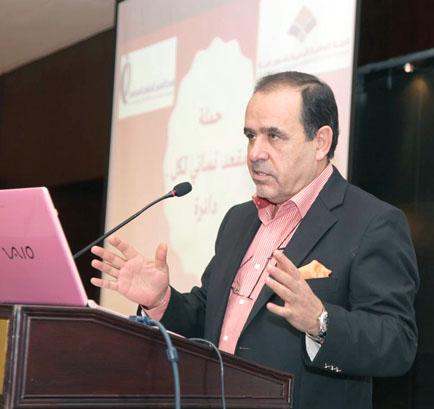You are here
Activists want 10% women’s quota in political parties
By Rana Husseini - Jan 21,2015 - Last updated at Jan 21,2015
AMMAN — The women’s movement in Jordan has sent a memo to a tripartite committee at the Lower House to call for reinstating a 10 per cent quota for women in the draft political parties law.
“We sent a memo to remind them of our demands, including maintaining a 10 per cent minimum quota for women in this draft law, to strengthen women’s presence in political parties,” said Salma Nims, secretary general of the Jordanian National Commission for Women (JNCW). In May last year, the government endorsed a draft political parties law that eased restrictions on the formation of parties.
A key component of the political reform process, the new version of the law reduces the required number of founding members from 500 to 150, and cancels quotas for young people and women.
The draft law is expected to be discussed during Parliament’s current ordinary session after it is endorsed by the tripartite committee.
Nims told The Jordan Times that the recommendations in the memo were the result of a meeting of civil society and women’s organisations held by the JNCW in June last year.
In 2005, female members in political parties did not exceed 6.8 per cent, but when the Political Parties Law was issued in 2007 and stipulated having a minimum of 10 per cent of women as members, their representation increased to 28.76 per cent in 2009 and approximately 32 per cent in 2013, she explained.
Women activists had said last year that the government’s decision to scrap the 10 per cent quota was aimed at “pleasing political party leaders in general and it all comes at the expense of women”.
At a regional conference held in Jordan in December 2013, Jordanian women complained that the lack of organised political parties, tribalism and awareness are the main obstacles to women’s participation in politics.
An elected member of the municipal council in Kura, in Irbid, Fatima Bani Yaseen said at the time that the tribal election system dominates political life in Jordan and men are not keen on handing over their power to women.
“Even women who participate in political parties are only there to fill a quota and are not really given a voice,” she argued.
That very risk was flagged in a report on women’s participation in politics and peace processes, “Equal power, lasting peace”, issued by the Swedish Kvinna till Kvinna foundation.“The mere presence of women on the decision-making committees without a voice can be counterproductive in the sense that it can be used to legitimise a decision taken by male members,” the report quoted Andrea Cornwall, a researcher, and anthropology and development professor, as saying.
Related Articles
AMMAN — A civil society coalition plans to organise a sit-in in front of Parliament to demand a seat for women in each of the constituencies
The women’s movement and civil society have called for including a minimum 30 per cent quota for women in the draft municipalities and decentralisation laws currently in Parliament.
AMMAN — A group of Jordanian civil society organisations on Monday said it will refer its demand to increase the number of seats for women i















